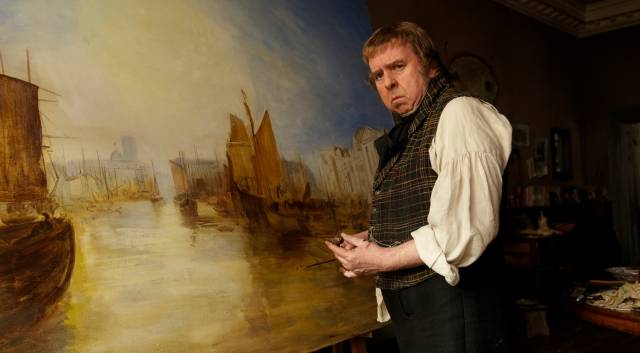
 Mr. Turner is a film by one English master about another – filmmaker Mike Leigh depicting the great Romantic painter JMW Turner, in Leigh’s opinion the greatest of all English painters, who brought a new intelligence to landscapes and nautical scenes and whose almost abstract use of color was a major influence on the Impressionists and other later schools of painting. The resulting film is a sometimes intriguing, sometimes stuffy character study, giving insight into the mind of a genius with a rough exterior and singular devotion to his craft.
Mr. Turner is a film by one English master about another – filmmaker Mike Leigh depicting the great Romantic painter JMW Turner, in Leigh’s opinion the greatest of all English painters, who brought a new intelligence to landscapes and nautical scenes and whose almost abstract use of color was a major influence on the Impressionists and other later schools of painting. The resulting film is a sometimes intriguing, sometimes stuffy character study, giving insight into the mind of a genius with a rough exterior and singular devotion to his craft.
The film begins with one of several absolutely stunning shots of the sort of sun-dappled landscape that Turner himself painted, with two women walking and laughing and Turner partially hidden by reeds, apart, observing. Then Turner (Timothy Spall) returns home, giving the audience its introduction to the man and his chosen environs. Spall gives a grunting and guttural performance as Turner, with strange body language and a calculatedly strange way of interacting with people, creating an enigmatic protagonist. At one point, he accuses his father of acting the dunce while possessing a keen mind, a lesson Turner himself seems to have learned, playing either the gentleman or the working class lad whenever either role suits him.
At the onset, Turner lives with a devoted and superficially scarred servant (Dorothy Atkinson) and his father (Paul Jesson). He is affectionate towards his father, who both cheerfully endorses his son’s work while also performing some of the support work, stretching canvases and the like. But Turner is far from a family man, as we learn when a former lover comes by the house to berate him for not supporting either her or Turner’s daughters with her. Turner simply listens with a bemused lack of attention, turns her out, and returns to work. But if Turner is contemptuous towards domesticity and misogynist and abusive towards some women in his life, he can also respect a highly developed female mind, as in one interesting scene where he watches with fascination as a Scottish natural philosopher displays her discoveries regarding the color spectrum.
Mr. Turner excellently illustrates Turner’s milieu, both his artistic colleagues and the rude world of commerce that they by needs must inhabit. Turner is celebrated by his peers, even as they fail to completely understand his artistic ambitions, and his high visibility sometimes turns to mockery by both royals and the population at large. Turner functions in this world, but he is not of it, keeping his deepest thoughts to himself and preferring solitude. Spall gives the sense that Turner despairs over his inarticulateness, even if he’s capable of the occasional cutting remark, and would rather keep his emotions close to his vest and express himself through painting.
Towards the end, Turner displays a more tender side as he romances a twice-widowed innkeeper, although he is still less than forthright with her. Mr. Turner can sometimes drag in scene after scene with little drama showing the texture and atmosphere of the period. But at its heart, the film is consumed with the more abstract questions of what is genius, what fuels it, and how can it exist in the world. Driven by an unforgettable portrayal by Timothy Spall, Mr. Turner is a fitting tribute to a great artist.